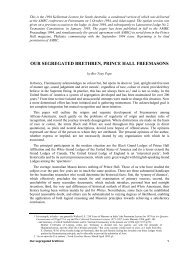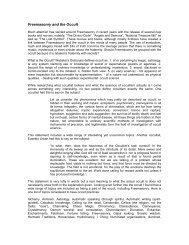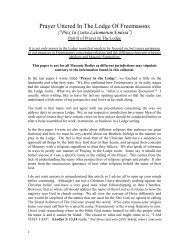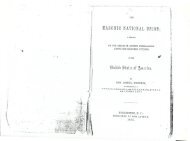- Page 3:
f 4./ 4.
- Page 8 and 9:
LONDON : MAURICE AND CO., HOWFORD-B
- Page 10 and 11:
INTRODUCTION. the artist, not of hi
- Page 13:
DRAMATIS PERSONS GONDABERT, Earl of
- Page 16 and 17:
6 THE ENGLISH SLAVE. [Act I. EDITHA
- Page 18 and 19:
THE ENGLISH SLAVE. [Act T I gain no
- Page 20 and 21:
10 THE ENGLISH SLAVE. [Act I. Mine
- Page 22 and 23:
12 THE ENGLISH SLAVE. (Act I. And b
- Page 24 and 25:
THE ENGLISH SLAVE. [Act I. EVANDA.
- Page 26 and 27:
16 THE ENGLISH SLAVE. [Act I. Thy b
- Page 28 and 29:
18 THE ENGLISH SLAVE. [Act I. I'll
- Page 30 and 31:
20 THE ENGLISH SLAVE. [Act II. ACT
- Page 32 and 33:
22 THE ENGLISH SLAVE. [Act II. 'Tis
- Page 34 and 35:
24 THE ENGLISH SLAVE. [Act II. EDGA
- Page 36 and 37:
26 THE ENGLISH SLAVE. [Act II. For
- Page 38 and 39:
28 THE ENGLISH SLAVE. [Act II. Whic
- Page 40 and 41:
30 THE ENGLISH SLAVE. [Act II. Foug
- Page 42 and 43:
32 THE ENGLISH SLAVE. [Act II. GOND
- Page 44 and 45:
34 THE ENGLISH SLAVE. [Act II. ALBE
- Page 46 and 47:
36 THE ENGLISH SLAVE. [Act II. GOND
- Page 48 and 49:
38 THE ENGLISH SLAVE. [Act III. And
- Page 50 and 51:
40 THE ENGLISH SLAVE. [Act III- My
- Page 52 and 53:
42 THE ENGLISH SLAVE. [Act III. By
- Page 54 and 55:
44 THE ENGLISH SLAVE. [Act III. ROD
- Page 56 and 57:
46 THE ENGLISH SLAVE. [Act III. GON
- Page 58 and 59:
48 THE ENGLISH SLAVE. [Act III. EVA
- Page 60 and 61:
50 THE ENGLISH SLAVE. [Act III. Fad
- Page 62 and 63:
52 THE ENGLISH SLAVE. [Act III. EDG
- Page 64 and 65:
THE ENGLISH SLAVE. [Act IV. ACT IV.
- Page 66 and 67:
56 THE ENGLISH SLAVE. [Act IV. To b
- Page 68 and 69:
58 THE ENGLISH SLAVE. [Act IV. ROGV
- Page 70 and 71:
60 THE ENGLISH SLAVE. [Act IV. s5 W
- Page 72 and 73:
62 THE ENGLISH SLAVE. [Act IV. FIRS
- Page 74 and 75:
64 THE ENGLISH SLAVE. [Act IV. From
- Page 76 and 77:
THE ENGLISH SLAVE. [Act IV. CATHIMA
- Page 78 and 79:
68 THE ENGLISH SLAVE. [Act IV. Now
- Page 80 and 81:
7 THE ENGLISH SLAVE. [Act IV. Hold
- Page 82 and 83:
7 2 THE ENGLISH SLAVE. [Act IV. Les
- Page 84 and 85:
74 THE ENGLISH SLAVE. [Act V. ACT V
- Page 86 and 87:
76 THE ENGLISH SLAVE. [Act V. Is th
- Page 88 and 89:
j? THE ENGLISH SLAVE. [Act V. Roder
- Page 90 and 91:
80 THE ENGLISH SLAVE. [Act V. CATHI
- Page 92 and 93:
z THE ENGLISH SLAVE. [Act V. CATHIM
- Page 94 and 95:
84 THE ENGLISH SLAVE. [Act V. I wea
- Page 96 and 97:
86 THE ENGLISH SLAVE. [Act V. No, b
- Page 98 and 99:
88 THE ENGLISH SLAVE. [Act V. Enter
- Page 100 and 101:
90 THE ENGLISH SLAVE. [Act V. CHORU
- Page 102 and 103:
92 THE ENGLISH SLAVE. [Act V. ROGVA
- Page 104 and 105:
94 THE ENGLISH SLAVE. [Act V. Off I
- Page 106 and 107:
96 NOTES TO THE ENGLISH SLAVE. and
- Page 108 and 109:
98 NOTES TO THE ENGLISH SLAVE. (9)
- Page 110 and 111:
100 NOTES TO THE ENGLISH SLAVE. sho
- Page 112 and 113:
JCEfc TO THE ENGLISH SLAVE. punisha
- Page 114 and 115:
104 NOTES TO THE ENGLISH SLAVE. pra
- Page 116 and 117:
106 NOTES TO THE ENGLISH SLAVE. The
- Page 118 and 119:
108 NOTES TO THE ENGLISH SLAVE. 40
- Page 121:
THE DEVOTED ONE A TRAGEDY.
- Page 124 and 125:
DRAMATIS PERSONS. CANUTE, King of E
- Page 126 and 127:
THE DEVOTED ONE. [Act I. Would stra
- Page 128 and 129:
118 THE DEVOTED ONE. [Act I. So lik
- Page 130 and 131:
120 THE DEVOTED ONE* [Act I. Degree
- Page 132 and 133:
122 THE DEVOTED ONE. [Act I. ULFMAN
- Page 134 and 135:
124? THE DEVOTED ONE. [Act I. Their
- Page 136 and 137:
126 THE DEVOTED ONE. [Act I. Whose
- Page 138 and 139:
128 THE DEVOTED ONE. [Act I. GODWIN
- Page 140 and 141:
130 THE DEVOTED ONE. [Act I. As I d
- Page 142 and 143:
132 THE DEVOTED ONE. [Act I. Of bot
- Page 144 and 145:
134 THE DEVOTED ONE. [Act I. That f
- Page 146 and 147:
THE DEVOTED ONE. [Act I. He will^ac
- Page 148 and 149:
138 THE DEVOTED ONE. [Act II, For n
- Page 150 and 151:
140 THE DEVOTED ONE. fAct II. When
- Page 152 and 153:
THE DEVOTED ONE. [Act II. A tender
- Page 154 and 155:
THE DEVOTED ONE. [Act II. From whic
- Page 156 and 157:
THE DEVOTED ONE. [Act II. And keen
- Page 158 and 159:
148 THE DEVOTED ONE. [Act Tl. So th
- Page 160 and 161:
150 THE DEVOTED ONE. [Act II, ZANDA
- Page 162 and 163:
THE DEVOTED ONE. [Act II. Then, of
- Page 164 and 165:
154 THE DEVOTED ONE. [Act II. Permi
- Page 166 and 167:
156 THE DEVOTED ONE. [Act II. And b
- Page 168 and 169:
158 THE DEVOTED ONE. [Act II. WALDI
- Page 170 and 171:
THE DEVOTED ONE. [Act II. O, let he
- Page 172 and 173:
162 THE DEVOTED ONE. [Act II. Condu
- Page 174 and 175:
164 THE DEVOTED ONE. [Act III. ACT
- Page 176 and 177:
166 THE DEVOTED ONE. [Act III. The
- Page 178 and 179:
168 THE DEVOTED ONE. [Act III. That
- Page 180 and 181:
To me was bitter insult ; THE DEVOT
- Page 182 and 183:
172 THE DEVOTED ONE. [Act III. Ye v
- Page 184 and 185:
THE DEVOTED ONE. [Act III, Crimson
- Page 186 and 187:
176 THE DEVOTED ONE. [Act III. EDRI
- Page 188 and 189:
THE DEVOTED ONE. [Act III. EDITH. F
- Page 190 and 191:
180 THE DEVOTED ONE. [Act III. I at
- Page 192 and 193:
182 THE DEVOTED ONE. [Act III. A fe
- Page 194 and 195:
184 THE DEVOTED ONE. [Act III. My s
- Page 196 and 197:
186 THE DEVOTED ONE. [Act III. SCEN
- Page 198 and 199:
188 THE DEVOTED ONE. [Act III. WALD
- Page 200 and 201:
190 THE DEVOTED ONE. [Act III, ERMI
- Page 202 and 203:
192 THE DEVOTED ONE. [Act IV. ACT I
- Page 204 and 205:
THE DEVOTED ONE. [Act IV. In battle
- Page 206 and 207:
196 THE DEVOTED ONE. [Act IV. EDRIC
- Page 208 and 209:
198 THE DEVOTED ONE. [Act IV. On wh
- Page 210 and 211:
200 THE DEVOTED ONE [Act IV. CANUTE
- Page 212 and 213:
202 THE DEVOTED ONE. [Act IV. /-Tha
- Page 214 and 215:
204 THE DEVOTED ONE. [Act IV O, who
- Page 216 and 217:
206 THE DEVOTED ONE. [Act IV. The h
- Page 218 and 219:
208 THE DEVOTED ONE. [Act IV. And r
- Page 220 and 221:
210 THE DEVOTED ONE. lAct IV. ERMIN
- Page 222 and 223:
212 THE DEVOTED ONE. [Act V. On thi
- Page 224 and 225:
THE DEVOTED ONE. [ActV. From the ea
- Page 226 and 227:
216 THE DEVOTED ONE. [Act V. Singe
- Page 228 and 229:
218 THE DEVOTED ONE. [Act V. Torn f
- Page 230 and 231:
220 THE DEVOTED ONE. [Act V. There
- Page 232 and 233:
222 THE DEVOTED ONE. [Act V. From t
- Page 234 and 235:
224 THE DEVOTED ONE. [Act V. SCENE
- Page 236 and 237:
226 THE DEVOTED ONE. [Act V. My my
- Page 238 and 239:
228 THE DEVOTED ONE. [Act V. Enter
- Page 240 and 241:
230 THE DEVOTED ONE. [Act V. THE SO
- Page 242 and 243:
232 THE DEVOTED ONE. [Act V. EDITH.
- Page 244 and 245:
234 THE DEVOTED ONE. [Act V. Thy sc
- Page 246 and 247:
THE DEVOTED ONE. [Act V. Blasting i
- Page 248 and 249:
238 THE DEVOTED ONE. Not the proude
- Page 250 and 251:
240 NOTES TO THE DEVOTED ONE. accos
- Page 252 and 253:
242 NOTES TO THE DEVOTED ONE. The P
- Page 254 and 255:
244 NOTES TO THE DEVOTED ONE. presi
- Page 256 and 257:
246 NOTES TO THE DEVOTED ONE. plant
- Page 258 and 259:
248 NOTES TO THE DEVOTED ONE. the p
- Page 260 and 261:
250 NOTES TO THE DEVOTED ONE. the J
- Page 262 and 263:
252 NOTES TO THE DEVOTED ONE. Creat
- Page 264 and 265:
254 NOTES TO THE DEVOTED ONE. 28 (
- Page 266 and 267:
256 NOTES TO THE DEVOTED ONE. daugh
- Page 269:
DRAMATIS PERSONS. WILLIAM THE CONQU
- Page 272 and 273:
262 THE VARANGIAN. [Act I. And make
- Page 274 and 275:
264 THE VARANGIAN. [Act I. Hath, br
- Page 276 and 277:
THE VARANGIAN. [Act I. Their dances
- Page 278 and 279:
THE VARANGIAN. [Act I. And all the
- Page 280 and 281:
THE VARANGIAN. [Act I, And if ye do
- Page 282 and 283:
THE VARANGIAN. [Act I. HEREFORD. It
- Page 284 and 285:
274 THE VARANGIAN. [Act I ODO. Supp
- Page 286 and 287:
276 THE VARANGIAN. [Act I. KING. Mu
- Page 288 and 289:
THE VARANGIAN. [Act I. LANFRANC. Ah
- Page 290 and 291:
280 THE VARANGIAN. [Act I. Commerce
- Page 292 and 293:
282 THE VARANGIAN. [Act I. Slaves,
- Page 294 and 295:
284 THE VARANGIAN. [Act I. They ivo
- Page 296 and 297:
286 THE VARANGIAN. [Act T. New myst
- Page 298 and 299:
288 THE VARANGIAN. [Act I. What sha
- Page 300 and 301:
290 THE VARANGIAN. [Act I. The dark
- Page 302 and 303:
292 THE VARANGIAN. [Act II. ZALMIRA
- Page 304 and 305:
294 THE VARANGIAN. [Act II. If thou
- Page 306 and 307:
296 THE VARANGIAN. [Act II, ZALMIRA
- Page 308 and 309:
298 THE VARANGIAN. [Act II. Why, En
- Page 310 and 311:
300 THE VARANGIAN. [Act II. When I
- Page 312 and 313:
302 THE VARANGIAN. [Act II, To pris
- Page 314 and 315:
304 THE VARANGIAN. [Act II. Judith
- Page 316 and 317:
306 THE VARANGIAN. [Act II. MATILDA
- Page 318 and 319:
308 THE VARANGIAN. [Act II. And ins
- Page 320 and 321:
310 THE VARANGIAN. [Act II. Many an
- Page 322 and 323:
312 THE VARANGIAtf. [Act II. The fi
- Page 324 and 325:
314 THE VARANGIAN. [Act II. Beside
- Page 326 and 327:
316 THE VARANGIAN. [Act It. JUDITH.
- Page 328 and 329:
318 THE VARANGIAN. [Act II. No fire
- Page 330 and 331:
320 THE VARANGIAN. [Act U. Hangs on
- Page 332 and 333:
322 THE VARANGIAN. [Act II. And tho
- Page 334 and 335:
324 THE VAEANGIAN. [Act II. Can nev
- Page 336 and 337:
326 THE VARANGIAN. [Act II. What si
- Page 338 and 339:
328 THE VARANGIAN. [Act II. I count
- Page 340 and 341:
330 THE VARANGIAN. [Act II. WALTHEO
- Page 342 and 343:
332 THE VARANGIAN. [Act III. By Chr
- Page 344 and 345:
334 THE VARANGIAN. [Act III. Those
- Page 346 and 347:
336 THE VARANGIAN. [Act III, We are
- Page 348 and 349:
338 THE VARANGIAN. [Act III. Its fu
- Page 350 and 351:
340 THE VARANGIAN. [Act III. SCENE
- Page 352 and 353:
342 THE VARANGIAN. [Act III. 'Twill
- Page 354 and 355:
344 THE VARANGIAN. [Act III. BEN-ZA
- Page 356 and 357:
346 THE VARANGIAN. [Act III. Heap o
- Page 358 and 359:
348 THE VARANGIAN. [Act III. The cr
- Page 360 and 361:
350 THE VARANGIAN. [Act III. When P
- Page 362 and 363:
352 THE VARANGIAN. [Act m. HEREWARD
- Page 364 and 365:
354 THE VARANGIAN. [Act III. Empurp
- Page 366 and 367:
356 THE VARANGIAN. [Act III. Enter
- Page 368 and 369:
358 THE VARANGIAN. [Act III. Strong
- Page 370 and 371:
360 THE VARANGIAN. [Act III. Enter
- Page 372 and 373:
362 THE VARANGIAN. [Act III. Is it
- Page 374 and 375:
364 THE VARANGIAN. [Act III. When I
- Page 376 and 377:
366 THE VARANGIAN. [Act IV. < Ah !
- Page 378 and 379:
THE VARANGIAN. [Act IV. Shed woe an
- Page 380 and 381:
370 THE VARANGIAN. [Act IV. OSMOND.
- Page 382 and 383:
372 THE VARANGIAN. [Act IV. Of that
- Page 384 and 385:
THE VARANGIAN. [Act IV. WALTHEOF ^s
- Page 386 and 387:
THE VARANGIAN. [Act IV. JUDITH. Not
- Page 388 and 389:
378 THE VARANGIAN. [Act IV. Of robb
- Page 390 and 391:
380 THE VARANGIAN. [Act IV. KING. W
- Page 392 and 393:
382 THE VARANGIAN. [Act IV. And as
- Page 394 and 395:
384 THE VARANGIAN. [Act IV. JUDITH.
- Page 396 and 397:
386 THE VARANGIAN. [Act IV. Enter W
- Page 398 and 399:
388 THE VARANGIAN. [Act IV. But tho
- Page 400 and 401:
390 THE VARANGIAN. [Act IV. These t
- Page 402 and 403:
392 THE VARANGIAN. [Act V ACT V. SC
- Page 404 and 405:
394 THE VARANGIAN. [Act V. On Denma
- Page 406 and 407:
396 THE VARANGIAN. [Act V. turn yet
- Page 408 and 409:
398 THE VARANGIAN. [Act V. Live wit
- Page 410 and 411:
400 THE VARANGIAN. [Act V. As pass
- Page 412 and 413:
402 THE VARANGIAN. [Act V. Who can
- Page 414 and 415:
404 THE VARANGIAN. [Act V. Of disap
- Page 416 and 417: THE VARANGIAN. [Act V. The great fe
- Page 418 and 419: 408 THE VARANGIAN. [Act V. Have pit
- Page 420 and 421: 410 THE VARANGIAN. [Act V. And thro
- Page 422 and 423: 412 THE VARANGIAN. [Act V. And wilt
- Page 424 and 425: 414 THE VARANGIAN. [Act V. All fema
- Page 426 and 427: 416 EDGAR'S ADIEU TO ENGLAND. EDGAR
- Page 428 and 429: 418 EDGAR'S ADIEU TO ENGLAND. Darkn
- Page 430 and 431: 420 NOTES TO THE VARANGIAN. It is p
- Page 432 and 433: 422 NOTES TO THE VARANGIAN. said ma
- Page 434 and 435: 424 NOTES TO THE VARANGIAN. " By th
- Page 436 and 437: 426 NOTES TO THE VARANGIAN. and the
- Page 438 and 439: 428 NOTES TO THE VARANGIAN. of that
- Page 440 and 441: 430 NOTES TO THE VARANGIAN. let, tu
- Page 442 and 443: 3 ( 9) NOTES TO THE VARANGIAN. Thos
- Page 444 and 445: 434 NOTES TO THE VARANGIAN. ( 44 )
- Page 446 and 447: 436 NOTES TO THE VARANGIAN. the wif
- Page 448 and 449: 438 ORIGIN, ANTIQUITY, AND These Es
- Page 450 and 451: 440 ORIGIN, ANTIQUITY, AND and cons
- Page 452 and 453: 442 ORIGIN, ANTIQUITY, AND doctrine
- Page 454 and 455: 444 ORIGIN, ANTIQUITY, AND that in
- Page 456 and 457: 446 ORIGIN, ANTIQUITY, AND of all c
- Page 458 and 459: 448 ORIGIN, ANTIQUITY, AND " Let no
- Page 460 and 461: 450 ORIGIN, ANTIQUITY, AND cencies
- Page 462 and 463: 452 ORIGIN, ANTIQUITY, AND tianity.
- Page 464 and 465: 454 ORIGIN, ANTIQUITY, AND we in po
- Page 468 and 469: 458 ORIGIN, ANTIQUITY, AND " The re
- Page 470 and 471: 460 ORIGIN, ETC., OF FREE-MASONRY.
- Page 472 and 473: CRITICAL OPINIONS OF THE FIRST SERI
- Page 474: CRITICAL OPINIONS OF THE FIRST SERI
- Page 479: M80669 THE UNIVERSITY OF CAUFORNIA






